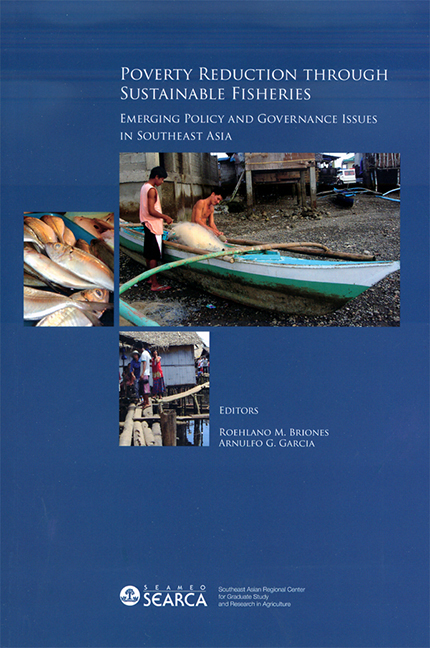 Poverty Reduction through Sustainable Fisheries
Poverty Reduction through Sustainable Fisheries Book contents
- Frontmatter
- Contents
- Figures
- Tables
- Foreword
- Acknowledgments
- 1 Introduction and Synthesis
- 2 Fish and the Poor
- 3 Fish and the Poor: The Case of Cambodia
- 4 Changing Demand and Supply Structure of Fish in Asia: Past Trends and Future Projections
- 5 Regional Economic Integration of the Fisheries Sector in ASEAN Countries
- 6 Technology Policies for Capture Fisheries and Aquaculture in Southeast Asia
- 7 The Status, Current Trends and Future Directions for Production and Technology of Fisheries in Southeast Asia
- 8 The Seafood Supply Chain and Poverty Reduction
- 9 Strategy for the Empowerment of Aquaculture Fish Farmers in Indonesia
- 10 Status of Coastal and Marine Resources: Implications for Fisheries Management and Poverty in Southeast Asia
- 11 Property Rights and Institutional Arrangements in Southeast Asian Fisheries
- 12 Regional Cooperation in Aquatic Resource Management for Southeast Asia
5 - Regional Economic Integration of the Fisheries Sector in ASEAN Countries
Published online by Cambridge University Press: 21 October 2015
- Frontmatter
- Contents
- Figures
- Tables
- Foreword
- Acknowledgments
- 1 Introduction and Synthesis
- 2 Fish and the Poor
- 3 Fish and the Poor: The Case of Cambodia
- 4 Changing Demand and Supply Structure of Fish in Asia: Past Trends and Future Projections
- 5 Regional Economic Integration of the Fisheries Sector in ASEAN Countries
- 6 Technology Policies for Capture Fisheries and Aquaculture in Southeast Asia
- 7 The Status, Current Trends and Future Directions for Production and Technology of Fisheries in Southeast Asia
- 8 The Seafood Supply Chain and Poverty Reduction
- 9 Strategy for the Empowerment of Aquaculture Fish Farmers in Indonesia
- 10 Status of Coastal and Marine Resources: Implications for Fisheries Management and Poverty in Southeast Asia
- 11 Property Rights and Institutional Arrangements in Southeast Asian Fisheries
- 12 Regional Cooperation in Aquatic Resource Management for Southeast Asia
Summary
ABSTRACT
The Association of Southeast Asian Nations (ASEAN) is committed to deepening and broadening its internal economic integration and linkages, with the participation of the private sector, to realise an ASEAN Economic Community by 2010, ASEAN's endgoal. The fishery sector is one of the 11 priority sectors identified by ASEAN Leaders. Roadmaps have been developed to ensure that the various measures are effectively and aptly implemented to create an integrated market and production base for each of these sectors. The implementing guidelines fall under two categories: (1) common measures, which cut across all the 11 priority sectors; and (2) specific measures, which have direct relevance to a specific sector. This paper discusses the Roadmap for Integration of the Fisheries Sector, including the results of the key informant interviews conducted by the WorldFish Center's research team in 7 out of the 10 ASEAN countries visited. The paper also includes insights on the existing common and specific measures contained in the roadmap, as well as recommendations on some additional strategies that can help hasten the implementation of the roadmap agreement in member countries.
INTRODUCTION
In December 1997, ASEAN Heads of State and Government unveiled the ASEAN Vision 2020. This document, among other things, envisioned a more economically integrated ASEAN. In particular, the ASEAN Vision 2020 foresees a stable, prosperous, and highly competitive regional economic area where there is free movement of goods, services, investments, and capital. Hence, the concept of an ASEAN Economic Community (AEC) would seem to be consistent with the economic aspect of this Vision.
Under this initiative, the AEC will see the ASEAN becoming a single market and production base. The diversity that characterises the region will be turned into opportunities and business complementation to make ASEAN a more dynamic and stronger segment of the global supply chain and world economy. It attempts to combine the economic strengths of member states for regional cohesiveness and enhanced global competitiveness by accelerating the integration of the various economic sectors in the member countries.
- Type
- Chapter
- Information
- Poverty Reduction through Sustainable FisheriesEmerging Policy and Governance Issues in Southeast Asia, pp. 75 - 106Publisher: ISEAS–Yusof Ishak InstitutePrint publication year: 2008


